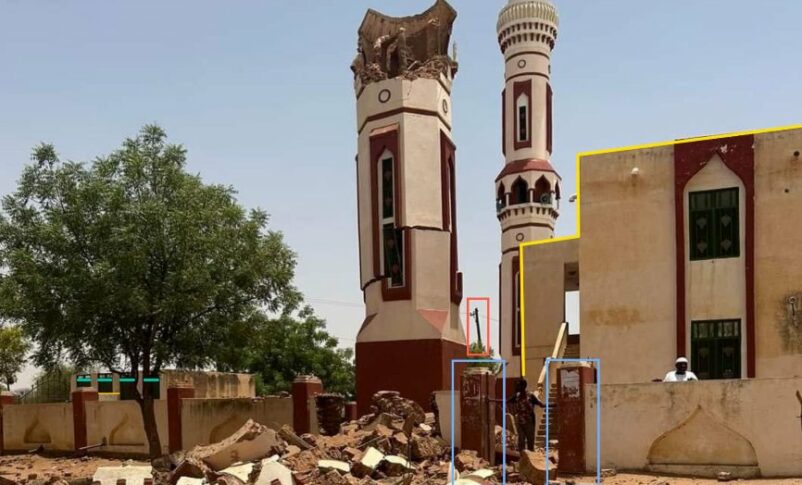Mosques in Sudan: From political tools to wartime targets
by Mohamed Badawi
Since the 1989 coup d’état, when the Sudanese Islamic Movement seized power under the guise of the Rescue Revolution Council, the new regime immediately adopted policies termed “moderate Sudanese Citizens.” This was a thinly veiled attempt to instil Islamic political ideologies into the governance of Sudan, solidifying their control. To achieve this, they systematically restricted freedoms in both public and private spheres through the implementation and enforcement of oppressive laws and regulations, notably the Public Order laws.
This agenda was furthered by groups of zealots who publicly promoted Islamic slogans, aiming to cultivate a new Islamic culture. This extended to the artistic realm, with the national television station even incorporating religious symbols into its logo.
Ultimately, the regime’s Islamization efforts sought to exploit religion as a shield against criticism and simultaneously legitimize attacks on any dissenting voices opposing their rule.
Furthermore, the regime strategically rebranded the civil war against the SPLM as a “jihad” to mobilize civilians for frontline combat. This involved systematic plans implemented by numerous organizations tasked with this goal, such as the “Jehad Call” (Neda Aljehad) and a weekly Friday evening television program called “Sahat Alfeda.” Additionally, regime-affiliated imams used Friday prayers to promote this narrative.
Even today, the regime continues to exploit mosques as gathering points to further its objectives. This includes calling for nighttime prayers as a show of support, and creating a mandatory display of loyalty at least twice a week known as “Giam Alil.”
During the former regime, mosques on some Sudanese university campuses were secretly used to stockpile weapons like iron bars and other materials by student members of the Islamic Movement. These hidden stashes were deployed during violent clashes against opposing student factions, particularly during university association elections.
In a more recent chapter, during the 2018 Sudanese revolution, mosques once again became political tools. Numerous regime-affiliated imams used their platforms and Friday sermons to undermine peaceful protests and their participants, falsely accusing them of acting against the interests of the Sudanese people. They also employed distorted interpretations of Islamic doctrine to discourage dissent against a Muslim ruler, misrepresenting this as religiously forbidden.
Since the outbreak of war in Sudan on April 15, 2023, mosques have become legitimate targets for warring factions. Numerous Muslim imams who advocated for peace have been arrested, while at least 12 mosques in Khartoum State and others in El Geneina and El Fasher have been shelled. Notably, on June 23, 2024, the RSF targeted the Altijania Sufi mosque in El Fasher, which residents had been using as a shelter. This attack tragically resulted in the deaths of eight children and injured at least twelve others, including children. It’s worth noting that RSF commander General Mohamed Hamdan Daglo, along with other key figures like Musa Hilal and the late Major General Ali Yagoub, are affiliated with the Tijania Sufi order.
Historically, mosques in Sudan were respected and shielded from political conflict and warfare. However, since 1989, the Islamic Movement regime has transformed them into platforms for political messaging and mobilization. The recent events demonstrate that political Islamists have no qualms about exploiting or targeting these sacred spaces in their pursuit of power. Their history bears witness to this, as seen in the 2004 Darfur conflict when at least 19 women and their infants were burned alive in Alsura village simply due to their ethnic affiliation with rebel groups.
In conclusion, political Islam has consistently misused places of worship for its own ends, disregarding their sanctity and targeting them during conflicts. This heavy-handed approach has eroded the values of those who join the military, placing them in a position where they are expected to follow the misguided leadership of political Islamists, even when it means violating the fundamental right to freedom of worship.

